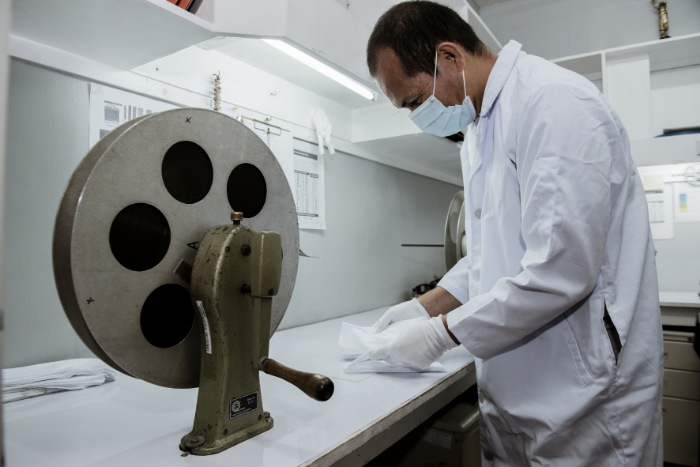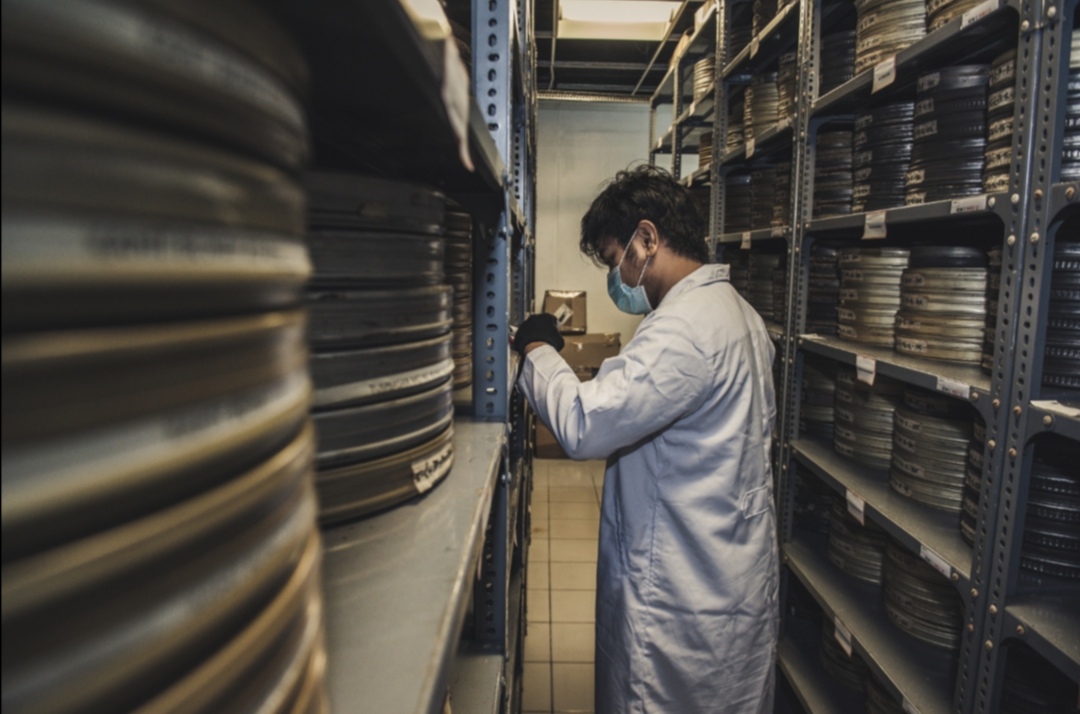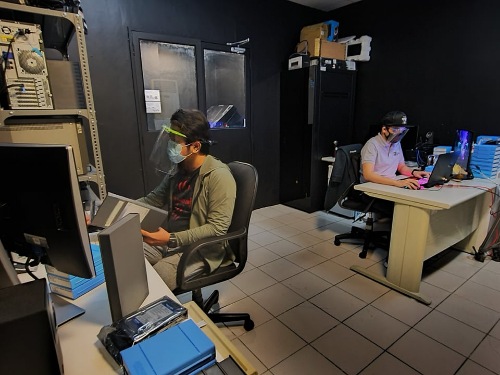Philippine Film Archive Keeps Up Operations Amid the Pandemic

MANILA, PHILIPPINES, SEPTEMBER 4, 2020 — When the Enhanced Community Quarantine and National State of Calamity due to the coronavirus disease 2019 (COVID-19) were declared in March, the Film Development Council of the Philippines (FDCP) ensured the continuity of its services by implementing a work-from-home setup and having an on-site skeletal team.
Part of the crucial skeletal workforce that continued to report to the FDCP Office in Manila is the Philippine Film Archive (PFA). There was no way for the PFA to suspend operations or completely work from home because it is tasked to protect and preserve the country's film heritage. At present, the PFA has 26,171 film elements.
The PFA has an emergency protocol which appoints staff to go to the office, monitor facilities, and perform maintenance activities of its collections such as cleaning, inspection of cooling systems, and monitoring and recording of the temperature and humidity in film vaults. Work plans were modified so that those who could work from home can operate the film scanning and restoration workstations remotely.
The PFA skeletal team continues to have alternating work schedules and staggered office hours. The FDCP also provides transportation and food for the PFA skeletal staff. The monitoring and maintenance staff are allowed to stay in the office on weekdays to avoid frequent travelling to and from the office.
Another reason why PFA staff need to stay in the office is because they have to continually preserve film elements that decay on a day-to-day basis. Despite the community quarantine restrictions, the PFA was able to list numerous accomplishments from April to June 2020.
The PFA Film Restoration Program, in partnership with the Korean Film Council and Korean Film Archive as part of their film digitization program, finished the digitization and sound repair for “Atsay” (1978) by Eddie Garcia. The PFA also completed the subtitles for “Manila by Night” (1980) by Ishmael Bernal and “Brutal” (1980) by Marilou Diaz-Abaya. It is currently arranging for the subtitling and translation of “Atsay.” The film restoration agreement with Central Digital Labs for “Dalagang Ilocana” (1954) by Olive La Torre was also finalized.

Under Film Inspection and Repair, the PFA worked on “Noli Me Tangere” (1961) by Gerardo de Leon and “Giliw Ko” (1938) by Carlos Vander Tolosa. For Film Scanning and Repair Automation, preliminary fixes were done on “Palaban” (2000) by Toto Natividad from the Rudy Fernandez Collection.
A total of 717 reels were rewound and transferred while 420 reels were inventoried from the PFA’s acquisitions. The Class A and Class B elements from acquisitions from the University of the Philippines Film Institute (UPFI) Film Center were rewound, transferred, and inventoried while the rewinding, transfer, and inventory process for Class C elements has been ongoing.
Moreover, the PFA digitized 34 videotapes, verified and catalogued 2,099 titles, released 300 DVDs of “Genghis Khan” (1950) by Manuel Conde as purchased by Globe, and rendered 31 movie titles for an upcoming FDCP project.
Through its IP Protection Program, the PFA reported 44 illegal uploads of “Ang Tag-araw ni Twinkle” (2013) by Gil Portes, “T’yanak” (2011) by Peque Gallaga and Lore Reyes, “Maynila sa mga Kuko ng Liwanag” (1975) and “Insiang” (1976) by Lino Brocka, “Emir” (2010) and “Badil” (2013) by Chito S. Roño, and “Fuccbois” (2019) by Eduardo Roy, Jr.
“The most important factor that allows us to sustain our operations is the dedication of our people,” stated PFA Head Don Gervin Arawan who shared that the PFA staff did not complain when they had to go to the office during the lockdown. Instead, they took the initiative to use their own bicycles and motorcycles, resort to carpooling, buy gears, cook food in the pantry, and bring their own food.
“Film archiving is a very special field. It is unique. You need to have a heart to be able to stay in this kind of work and environment,” added Arawan. The PFA Head then mentioned how they abide by the minimum health and safety guidelines prescribed by the government.

Everyone was briefed about the health and safety protocols. Wearing surgical face masks is something that the PFA staff members have been doing even before the pandemic because such is a requirement especially for film handling.
As required by the nature of archiving, PFA facilities always have to be clean. But sanitation and disinfection must be amped up that is why footbaths have been installed, face masks, face shields, and rubbing alcohol are provided, and regular cleaning and disinfection of work areas have become mandatory whenever a staff returns to his or her table.
Movements are also limited in the workspace and physical distancing with at least a one-meter distance is being strictly implemented. Some areas in the PFA Office were rearranged to achieve this. The PFA Office also does not allow the entry of other FDCP staff and officers from other divisions without prior approval.
Moreover, the PFA gives its staff Vitamin C to help them boost their immune system. The PFA also asks staff members about their other means of transportation, places they go to outside of work, and if there are people in their community who are exposed to the novel coronavirus so that the risks of COVID-19 transmission and infection can be mitigated within the PFA, FDCP, and the workers’ respective communities.
With no cure or vaccine in sight in the near future, such setup of the PFA will carry on. Thanks to the PFA emergency protocol and the FDCP’s provision of alternative work arrangements and assistance to skeletal staff, the PFA’s collection of thousands of film elements are safely monitored, maintained, and preserved amid the pandemic.
Source: http://fdcp.ph/media/philippine-film-archive-keeps-operations-amid-pandemic

